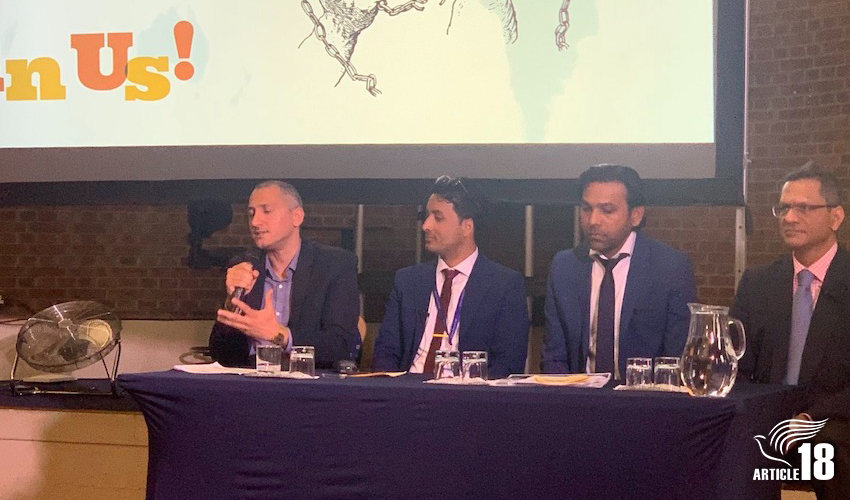في إيران عندما تسمى مرتداً لا يروا فيك مخلوقاً بشرياً
‘When they call you “apostate”, they don’t see you like a human anymore’
July 09/2022/articleeighteen.com/news
Iranian Christian convert Mojtaba Hosseini was one of the speakers at a fringe event on the side of the International Ministerial on Freedom of Religion or Belief in London this week, which focused on apostasy and blasphemy laws around the world.
Iran is one of a dozen countries where leaving Islam is still punishable by death, even if this has not been enforced since the hanging of Rev Hossein Soodmand in 1990.
And Mojtaba, who spent three years in prison for joining a house-church after converting to Christianity, said: “When they call you ‘apostate’, maybe they don’t kill you, but they don’t see you like a human anymore, so they give this right to themselves to just treat you anyway they like.”
Mojtaba explained how before converting to Christianity he wasn’t even aware that it was dangerous to practise the Christian faith in Iran.
“Me and my brother went to official church, an Anglican church in my city, Shiraz,” he said. “And the person opened the door and said, ‘I’m sorry, we can’t let you in. The government has banned us to let anyone in.’”
And after joining a house-church, Mojtaba was then arrested and held in solitary confinement for 22 days, and subjected to what he described as “such heavy interrogations”.
Aged 20 at the time, he said the whole experience was “a big shock”.
“It was so tough,” he said. “I think I can say it was the toughest experience I’ve had, even harder than when my dad passed away.”
Mojtaba said he was later “forced” to flee Iran and become a refugee in Turkey, which he called “a continuance of all I faced and the suffering I had, because I didn’t have any rights in Turkey, and lots of trauma with me; I didn’t have any support, and the immigration pain added to previous pains.”
“The Iranian government not only they put chains on my hands and my feet,” he said. “By forcing me to leave Iran, they put a chain on my heart.”
‘One of my heroes’
Introducing the event, organiser Kamal Fahmi, founder of Set My People Free, had described another Iranian “apostate”, Mehdi Dibaj, as one of his heroes.
“He was the head of the Bible Society [in Iran],” Kamal explained. “And he was arrested and convicted for apostasy. He was sentenced to death, and he was imprisoned for nearly 10 years.
“He said, ‘I’m not just willing to suffer for Christ, I’m also willing to die for him.’ And he was released after a lot of pressure from the international community. And when he was released, two weeks later, the pastor who helped to get him out [Haik Hovsepian] was murdered. And people said to Mehdi Dibaj, ‘Leave Iran, you will get killed!’, but he decided to stay. And six months later, he was kidnapped and disappeared. And his body was found cut to pieces in a plastic bag.”
‘The most dangerous thing’
Another speaker, Thomas Schirrmacher, Secretary General of the World Evangelical Alliance, described converting from Islam to Christianity as “the most dangerous thing you can do”.
“Everyone should have the right to decide on his own faith, on his own worldview, and whatever way he changes should be free to do this without being threatened by any kind of penal law, and truly not by death,” he said.
“But at the same time, we have to see that the most dangerous thing in the moment, statistic-wise, you can do is change from Islam to Christianity.”
Thomas Schirrmacher, Secretary General of the World Evangelical Alliance.
Meanwhile, Ulrika Sundberg, Sweden’s Special Envoy to the Organisation of Islamic Cooperation on Interreligious and Intercultural dialogue, said blasphemy laws were “counterproductive”, as “not only do they have a chilling effect, but they actually censor all inter- and intra-religious belief and dialogue, debate and criticism, most of which would be constructive, and in many times is needed.”
Ms Sundberg also noted how Article 6 of the International Covenant on Civil and Political Rights allows for the death penalty to be used only for the most heinous crimes.
“Now, can we consider blasphemy to be one of those?” she asked. “No, I think we can reasonably convince them [countries that apply the death penalty for blasphemy] that it’s not necessary.”
Jennifer Tridgell, Senior Legal Advisor to the UN’s Special Rapporteur on Freedom of Religion or Belief, agreed that both apostasy and blasphemy laws are “neither justified, nor justifiable within international human rights law”.
She added that Special Rapporteur Ahmed Shaheed has “also been very clear that freedom of religion or belief as a human right protects individuals, not religions or belief as such, from critique or criticism”.
Meanwhile, former Dutch parliamentarian Joël Voordewind explained how his involvement in the case of Mariam Ibraheem, a Sudanese woman sentenced to death for apostasy while pregnant, had “opened [his] eyes to the cruelty of not being able to convert from Islam to other faiths, or even to be a non believer”.
Mariam was another of the speakers at the event, alongside other survivors from Pakistan, Nigeria and Yemen.
*Picture Enclosed/Mojtaba Hosseini (left), alongside three other survivors of apostasy and blasphemy laws around the world.




















